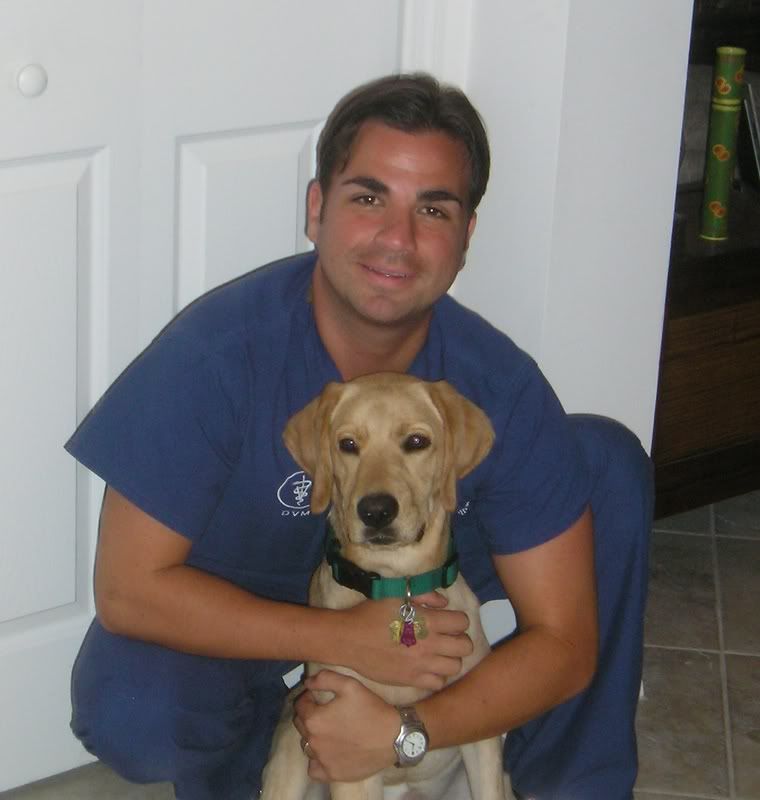Transcript from today's episode of The Web-DVM:
This story brings me to my personal comment tonight. My cynical side reads this story and thinks that its a darn good thing that Romeo's assailant was not a famous NFL football star, since if he were, there would not likely have been a serious conviction nor the creation of Romeo's Law. Some degree of cynicism is an unfortunate byproduct when considering some of the reactionary comments to my Michael Vick piece last week, where I was taken back not only by the number of people that were strongly in support of him, but also some of the vile comments posted on my You Tube channel and sentiments they wrote in his defense. To be fair, the majority comments did tip in favor of those who wholly reject Michael Vick no matter what he can do on the playing field or for a football team, and a few comments in support of him did offer at least reasonable alternate opinions.
However, the majority of pro Vick comments were offered in the most profane and disturbing fashion. I will not repeat the comments directly, but leave you to read them for yourself still posted on my YouTube channel. Parental discretion is advised.
In the PG summary, some of my critics insinuated that I am some kind of animal rights extremist, picking the well being of another species over that of my own. Another justified cheering for Vick because the life of a dog is less important than that of a person. Yet another accused all of those who oppose Vick of being racists.
Folks, this issue is not a matter of picking the well being of another species over that of people, it is trying to prevent innocent pain and suffering and removing those who wantonly engage in such acts of cruelty against the innocent. Does this beautiful animal pictured here deserve abuse for no reason other than the fact that he was defenseless and vulnerable?

Should the man that abused him for no other reason than sadistic pleasure be allowed to act in that manner without any accountability. Is that the kind of people we want to be? Apparently some do.
Make no mistake, ladies and gentlemen, cruelty and crimes against the innocent and vulnerable illustrates the true nature of a person whether enacted upon animals or children, or women. Studies prove time and again that those who abuse animals are likely commit domestic violence and other violent crimes.
70% of animal abusers were found in one 20 year study to have then committed other crimes, and 44% went on to harm people. (Arluke, A. & Luke, C. 1997).
In another recent study 99% of animal abusers had convictions for other crimes. (Clarke, J. P. 2002). In that same study it was found 100% of people who committed sexual homicide had abused animals. (Clarke, J. P. 2002). That study also revealed 61.5% of animal abusers had assaulted a human as well. (Clarke, J. P. 2002).
63.3% of inmates in one prison study who were in for violent crimes admitted to abusing animals. This doesn't include the ones who didn't admit it. (Schiff Louw Ascione, 1999)
Police have actually found animal abuse is a better predictor of whether someone will commit sexual assault than previous convictions for murder or arson. (Clarke, J. P. 2002). That is remarkable!
71% of women in a battered women's shelter reported their abuser either abused a household pet or threatened to abuse a pet. (Ascione, 1998)
In another study 88% of child abusers also abused the animals in the home. (Ascione)
[References for all of these studies if your are interested, are posted on our blog at webdvm.blogspot.com.]
These statistics prove beyond any shadow of a doubt that animal abuse laws are as much about recognizing the danger to people from animal abusers as these laws are about protecting animals. The lives of humans as well as animals depend on it. The sooner we recognize that, the better off we will all be.
I congratulate Kentucky for having the wisdom to recognize this, and make a bold statement in the name of an innocent, defenseless victim they gave a voice to, and other victims they will continue to give voices to. I just hope that the rest of the country takes notice and follows their example.
That is our show for this Friday, December 18, 2009. I will be taking the next 2 weeks off for Christmas and New Year's. I want to thank all of you viewers for making us a success with your participation, having progressed from just 105 views in our first episode, to now attracting between 3000 - 7000 views per episode. I look forward to bringing you the news and reading your reactionary comments to my commentary in the new year ahead. We will return on Friday, January 7, 2010, where I will be discussing The Myth of the Rich Veterinarian, so be sure to tune in.
Happy Holidays to all from The Web-DVM!
Dr. Roger Welton is the President and chief veterinarian at Maybeck Animal Hospital in West Melbourne Florida, as well as CEO of the veterinary advice and health management website Web-DVM.net.




